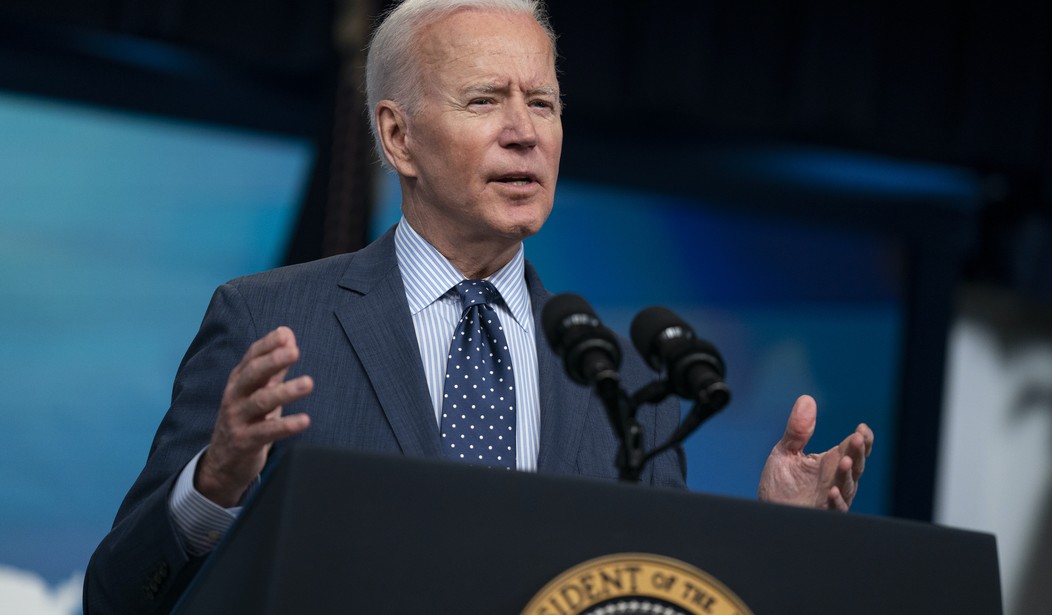President Joe Biden released his budget for the new fiscal year last week, and while many words could be used to describe its far-left policy proposals, perhaps the most important is “reckless.”
The price tag for Biden’s budget is a whopping $6 trillion, and it includes absolutely massive increases in domestic spending.
Among the laundry list of big-ticket items proposed by the Biden administration are $174 billion for electric vehicles, $100 billion to expand high-speed internet, $200 billion for “free” universal pre-K, and $109 billion for “free” community college.
To partially offset the gargantuan costs of these programs, Biden wants Congress to increase taxes by $3.6 trillion, including one of the largest tax hikes on corporations in U.S. history. (The corporate income tax rate would increase from 21% to 28%.)
The tax increases on corporations and some small business owners wouldn’t come close to covering the costs of Biden’s budget, and they might be enough on their own to trigger a recession. After all, America is, in case President Biden has forgotten, still in the midst of recovering from one of the largest economic catastrophes in world history. You don’t need to have a brilliant economic mind to know that raising taxes on job creators while millions of people are out of work doesn’t make much economic sense.
But perhaps even more troubling for America’s future than Biden’s tax increases is his proposed increase in government spending.
Recommended
According to Biden’s own, almost certainly flawed budget estimates, the United States would run a $1.8 trillion deficit next year, a figure that’s larger than nearly every deficit recorded in American history prior to the COVID-19 pandemic. (The only exception could be 2009, which also experienced a $1.8 trillion deficit.)
Even worse, the Biden administration estimates the national debt would grow to117% of the U.S. GDP by 2031. That means Biden’splanis to increase the national debt by so much that it would be larger than the total value of the entire economy — and all within just one decade.
The only conceivable way the U.S. government could pay its bills under a Biden budget would be to continue “printing” unprecedented amounts of new dollars. The Federal Reserve created trillions of new dollars in 2020 and early 2021, more than it had ever issued before, causing its balance sheet to skyrocket.
Now that the economy is starting to reopen, the trillions of dollars created by the Fed and distributed by the federal government are starting to drive inflation, devaluing the dollar.
Based on the Consumer Price Index (CPI), the inflation rate in April 2021 was 4.2%, nearly62% higher than it was in March 2021, a month that had also experienced a sharp increase in inflation compared to most of 2020 and early 2021.
According to one CNBC analyst, “The increase in the annual headline CPI rate [in April 2021] was the fastest since September 2008, while the monthly gain in core inflation was the largest since 1981.”
The Federal Reserve cannot possibly continue to finance America’s out-of-control debt, a national debt that will get substantially worse under President Biden’s budget, while also continuing to allow interest rates to remain at historically low levels. Interest rates will need to be increased soon, especially if Biden’s budget — or anything close to it, for that matter — is enacted.
The more the national government spends, the more interest rates will need to be raised to curb inflation in the coming years. And the more interest rates rise, the more likely it is the U.S. economy will crash because at present, much of it is being propped up by cheap lending.
If interest rates are forced too high too quickly, the costs associated with financing a home or car, business loans, and some student loans would all become substantially larger, putting downward pressure on those markets and limiting economic growth.
Under such a scenario, the Biden administration would not be able to simply print more money to stimulate the economy, because higher interest rates would make it too costly for the government to pay the interest on the debt. The country could potentially find itself in a catastrophic economic situation.
If the Fed refuses to raise interest rates, then inflation will get much worse.
Either way, the economy will suffer if Biden gets his way.
The U.S. economy does not need more debt, higher deficits or larger government programs. It needs the Biden administration to restore fiscal sanity by reducing government debt to responsible levels and to limit burdensome taxes and rules so that businesses can grow and Americans can get back to work.
Unfortunately, that’s not likely to occur. Americans everywhere should plan accordingly.
Justin Haskins(Jhaskins@heartland.org)is the director of the Stopping Socialism Project and a research fellow at The Heartland Institute, a free-market think tank.

























Join the conversation as a VIP Member